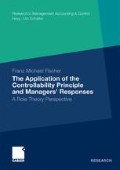Abstract
The controllability principle stipulates that managers should be held accountable only for what they can control (Atkinson, Kaplan, Matsumura, & Young, 2007, p. 588; Bhimani, Horngren, Datar, & Foster, 2008, p. 488). Mostly regarded as a normative principle (Bourguignon & Chiapello, 2005, p. 686), it is intuitive and well-accepted throughout management accounting literature (Merchant & Otley, 2006, p. 793). Due to its importance in the design of management control systems (MCSs) the controllability principle has even been termed one of the strongest maxims in management accounting (Merchant & Van der Stede, 2007, p. 33; Simons, 2007, p. 1).
Access this chapter
Tax calculation will be finalised at checkout
Purchases are for personal use only
Preview
Unable to display preview. Download preview PDF.
Rights and permissions
Copyright information
© 2010 Gabler Verlag | Springer Fachmedien Wiesbaden GmbH
About this chapter
Cite this chapter
Fischer, F. (2010). Introduction. In: The Application of the Controllability Principle and Managers’ Responses. Gabler. https://doi.org/10.1007/978-3-8349-6030-6_1
Download citation
DOI: https://doi.org/10.1007/978-3-8349-6030-6_1
Publisher Name: Gabler
Print ISBN: 978-3-8349-2267-0
Online ISBN: 978-3-8349-6030-6
eBook Packages: Business and EconomicsBusiness and Management (R0)

